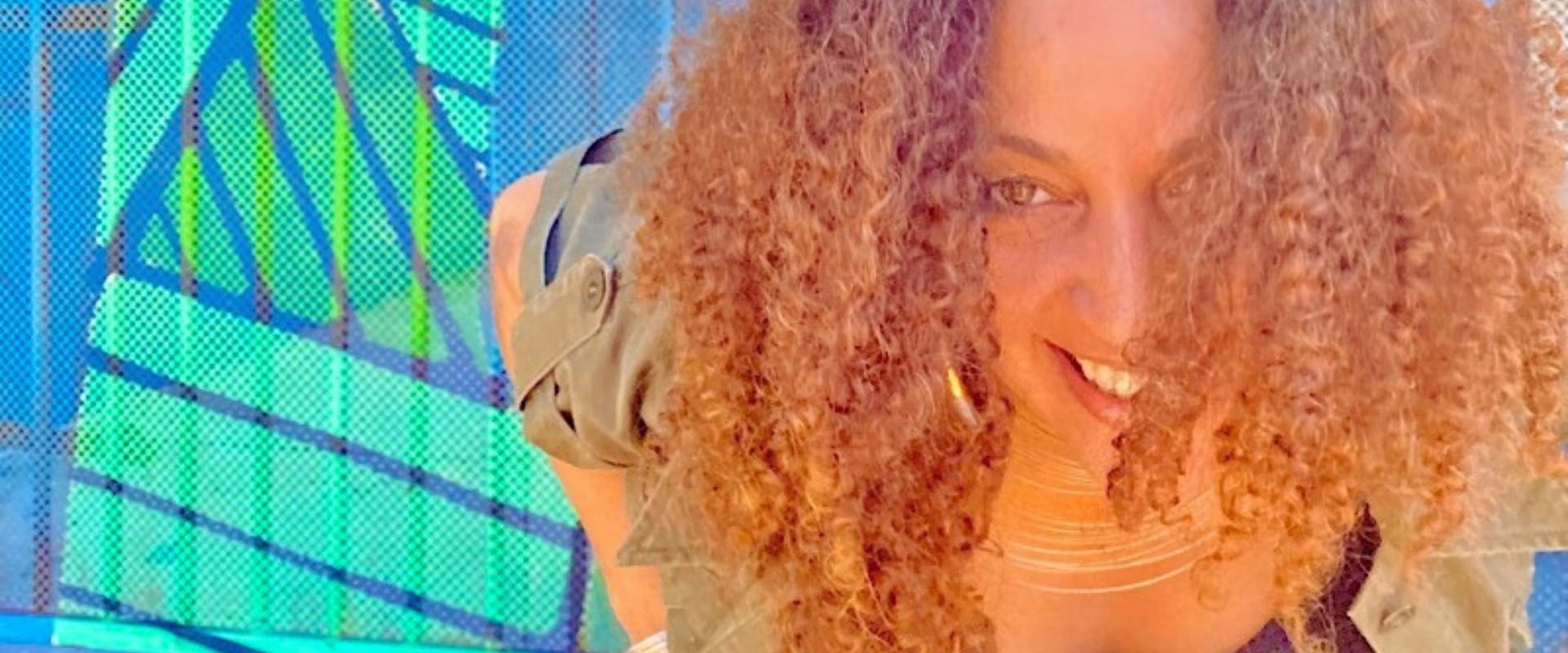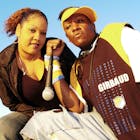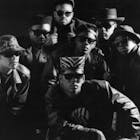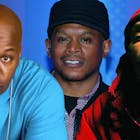
Mystic On Art, Community, and Embracing Love
Mystic Talks the Importance of Art, Community, and Embracing Love
Published Tue, December 6, 2022 at 9:44 AM EST
Talking with Mystic feels like connecting with an old friend.
A dynamic artist and visionary, Mystic's art was brought to the limelight 20 years ago with her debut album, Cuts For Luck and Scars for Freedom, an expansive, insightful project that delved deep into the traumas, joys, and resiliency connected to the human experience.
Twenty years later, Mystic, who began her career as a member of the legendary Bay Area collective Digital Underground, is still just as thoughtful about her work as she was back then. The major difference? She's freer than she's ever been. She left the confines of the industry in 2004 and pursued higher education (she has a master's in comparative and international education from Oxford) which brought her even closer to the community, where she's been long active, including through projects like Revolve Impact's #SchoolsNotPrisons, where she was called upon by journalist dream hampton to lend her knowledge and heart.
But Mystic never abandoned her art. In fact, her art has grounded and centered her, connecting her to all of the things she loves in a tangible, meaningful way.
To that end, earlier this year, she dropped Dreaming In Cursive: The Girl Who Loved Sparklers an ethereal exploration of love and wholeness, and her first full-length album since 2014's Beautiful Resistance. With it, Mystic shared the first part of her forthcoming Black Love Trilogy short film, starring Bay Area great Ray Love, as a music video for "Butter (Green Light)," featured on the album.
"This is my heal black woman music," she says of the project. "This is the first album that I have made that is not grounded in trauma."
Ultimately, like so much of her work, the project is about love.
"This is my healed music," she says. "This is my love music. This is about loving myself. It's about loving my sisters loving my brothers loving our collective children, and loving our communities. It's about calling for justice. It's about trying to give these loving reminders and affirmations. That no matter if we live in slums are no matter what we're going through. are powerful. We are beautiful. We are worthy. We are deserving. And yes, we are magic."
ROCK THE BELLS caught up with Mystic to talk about her new album and upcoming short film, her relationship with Digital Underground, community work, and why love is at the center of everything she does.


Cuts For Luck and Scars for Freedom was such a great album. What does the album mean 20 years later?
I mean, who even knew I would actually put out records when I started writing when I was a teenager, right? But I put out Cuts for Luck and Scars for Freedom when I was 27, and I would still describe myself at that point as being a broken Black girl who was on a journey to find healing and try to understand the world and what it meant. To have it come 20 years later when it really hadn't been available to people was a powerful experience. When I listened to that album now, I so love the girl that I was. I wish the songs didn't make sense in 2022. I wish there weren't still young women and young men going through the losses or the traumas that I was going through, or [still] trying to look for justice in the world.
Talk about the process of getting your masters for the album back.
When I walked away from my deal it wasn't that I got dropped or anything like that happened. I literally fought to get out of my deal with DreamWorks at the time. My lawyer thought I was crazy. My booking agent and everybody on my team was like, 'What's the problem?' But I so wanted to hold on to my love of the craft. I was watching all these people lose their jobs at that point in the music industry, who I loved and who I was close with. I needed to step back. I wanted to serve children. I still wanted my freedom, [so much] that I was willing to walk away from the masters. I was like, I will walk away from everything so I can get my freedom. And so I did that. Little did I know, thank you to my lawyer, that from the moment that that paperwork was done, and I got out, I actually own the masters. So the entire time that I was off, stepping back from the music industry and going to school, that album actually belonged to me. The only way that I found out was that I was looking through paperwork. And then we reached out to Universal. And they said, 'Well, we have paperwork, but you have to get clearance.' And thankfully, when you have good relationships with the people who originally signed you, they told Universal, 'Give her everything you got.' And then we were able to see and Universal was like, 'Oh, we don't even own that.' So Universal didn't know they didn't own it.
DROP YOUR EMAIL
TO STAY IN THE KNOW
That was a major, bold decision to choose to leave the industry the way you did —what prompted it?
Yeah, so I was a high school dropout. I am somebody who had my educational journey, or trajectory disrupted by experiencing trauma, and not discussing that trauma. You know, and originally, when I talked about it publicly, it's not really the way particularly in Hip-Hop that we were talking about it, but I was raped when I was younger — I told no one. And that'll throw your whole, like sense of self and life off, right? So art was my saving grace. But I started writing when I was 16, I started working with children when I was 17. Children have always been my heart. And they also taught me that I was still worthy. And I was still beautiful. I mean, look, I was a kid working with kids. And they showed me that I was still good and valuable and worth love, in these powerful ways that I wasn't necessarily feeling in the world from others. And so I went and did all my music stuff. I've always used my platform to advocate for justice, and organizations will call and say we're trying to fund a children's arts program, will you come out? And I'm like, of course, right? I'm known for being like, 'What is it that I can do that help you serve your community?' As I was touring I just really missing children and the community.
But like I was saying, the industry at that time, the early 2000s — this is this transition from a physical product to a digital world. I came up with all these amazing people in the music, business artists, and those behind the scenes, and literally, people were losing their jobs. They were getting fired. People were letting being let go without being paid. And so to watch that happening to people was just really hard. And I felt like I was gonna fall out of love with what I was so in love with it. And I know, Hip-Hop artists to this day, who are rightfully bitter, and they're angry. And this, the music industry made them hate the art, the process of being an artist within the industry, and I never ever wanted that. I never, ever wanted that to happen. I never thought that I would necessarily get to the level of success that I had. I think I just was looking around at it all. I thought I need to go back to children. But I also was looking at what was happening in the world, and with children and thought, I don't want to simply walk into rooms as an artist. You know, glitter is lovely [but] I wanted to be able to walk in and be an effective advocate. I wanted to be able, as opposed to complaining about what's happening in our communities, I wanted to gain additional knowledge.
The labels push, they didn't want to let me out of my contract. People did not want to let me go. So it really was a battle. And when my lawyer called me and said, 'Oh, you're going to be free' I started crying. He said, 'Why are you crying? 'I said because I'm free. Right? Like we did it and I went out and got a big freedom tattoo over my shoulder and cut my hair off and was like, I don't have to do any of this anymore and just went back to living life. But I think that really, I couldn't have known it at the time but I think it saved my life. I think that it helped me to be able to heal outside of being in the public eye. It allowed me to reclaim myself. It was a powerful opportunity for me to heal, and then also begin to create art outside of the public eye and the industry itself.
"I don't want to simply walk into rooms as an artist. I wanted to be able to walk in and be an effective advocate."
You have Black Love Trilogy coming out next year. What was your intention with that project?
The intention is to uplift Black love and to represent Black love in a way that is not about Black love being transactional, that is not about a toxic relationship. It's not about that. But just because something's not toxic doesn't mean the journey that we go through in any of our relationships, whether they be personal or romantic, or even professional sometimes, there's not an ebb and flow. You have to work through getting to know someone. I talk about walking into love as opposed to falling in love. Like being really intentional about what you're doing with somebody.
"The intention is to uplift Black love and to represent Black love in a way that is not about Black love being transactional. I talk about about walking into love as opposed to falling in love."
How has your relationship with Digital Underground evolved over the years?
I started being brought into Digital when I was like, 20, or 19. I was already rolling with Money-B and Clay and other folks. I was living in Miami when 2Pac was murdered but I had already recorded with Shock G before I moved to Miami. It was transformational. I went out and toured across the country and experienced places I had never experienced, such as the Deep South, with myself and 11 Black men. And I learned in a really different way at a young age not just the importance of a brotherhood, and taking care of your family, but that if you have people who are willing to live for you and die for you, you have to be responsible for the way that you carry yourself, and the way that you move, and how you interact in the world. And so I learned how to move differently. I didn't pop off as much because that would mean that they would then get involved.
Touring, I learned how to laugh. Shock G taught me how to laugh. That first couple of days on the first tour, I literally laughed so much my stomach muscles hurt. And I learned about what true love is — that is not in requirement and is not bound. You go through things, but I'm always gonna love you. And I will always be here if you need me. But here's the thing about Digital Underground– you're always part of Digital. We've just always stayed together. Digital Underground is not just a musical family, it's a family. People's parents are like parents to me ... that's my crew forever. And thankfully, they held me up when I was a little bit wilder and they loved me when I was broken, and they still hold me and love me now, and it's an honor to love them.






